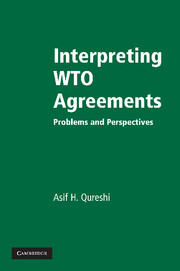Book contents
- Frontmatter
- Contents
- Preface
- List of Abbreviations
- Introduction
- 1 Interpreting principles of treaty interpretation in the WTO
- 2 Interpreting institutional aspects of the WTO Agreements
- 3 The national dimension to interpretation in the framework of the WTO
- 4 Interpreting exceptions in the WTO Agreements
- 5 Interpreting the WTO Agreements for the development objective
- 6 ‘Interpreting’ in external concerns
- 7 Interpreting the agreements on trade remedies
- Conclusion
- Annexes
- Index
2 - Interpreting institutional aspects of the WTO Agreements
Published online by Cambridge University Press: 23 February 2010
- Frontmatter
- Contents
- Preface
- List of Abbreviations
- Introduction
- 1 Interpreting principles of treaty interpretation in the WTO
- 2 Interpreting institutional aspects of the WTO Agreements
- 3 The national dimension to interpretation in the framework of the WTO
- 4 Interpreting exceptions in the WTO Agreements
- 5 Interpreting the WTO Agreements for the development objective
- 6 ‘Interpreting’ in external concerns
- 7 Interpreting the agreements on trade remedies
- Conclusion
- Annexes
- Index
Summary
Introduction
In the now-substantial literature on WTO law, the legal focus has traditionally been oriented towards the substantive law aspects of the WTO Agreements – with the important exception of the dispute settlement system. The dispute settlement system is an important institutional pillar of the WTO, but it is not its only institution. In some senses, research and analysis have responded to the disputes developing around international trade liberalisation. Further explanations for this orientation lie in the institutional character of the WTO, namely, the relative age of the institution, the pace of its institutional development compared with the pace of development in its substantive law, and the non-controversial nature of a number of the institutional aspects of the WTO Agreements. In addition, it can be generally, albeit somewhat impressionistically, observed that a large number of the new breed of international trade lawyers – both academic and practising – have more of a substantive law interest in WTO law, often approaching the subject with the baggage of environmental law, general international trade law, European law and economic analysis of law. Indeed, those with expertise tend to be relatively less steeped in public international law, and consequently in the institutional aspects of the WTO Agreements. Thus, in the short time during which the WTO has been in existence there have been few exhaustive monographs exclusively on the institutional aspects of the WTO. Generally, legal treatises on the WTO, after historical and general institutional introductions, rapidly go on to focus at length on the substantive law aspects of the WTO and the dispute settlement system. More specifically, there has been little focus on the context of interpretation of the institutional aspects of the WTO.
- Type
- Chapter
- Information
- Interpreting WTO AgreementsProblems and Perspectives, pp. 30 - 69Publisher: Cambridge University PressPrint publication year: 2006



